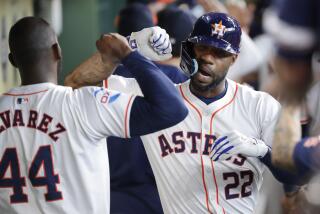He Will Do It His Way
HAHIRA, Ga. — J.D. Drew’s leisurely upbringing amid the peaches, peanuts and pecans of this southern Georgia speck on the map made him practiced at patience -- a virtue that has resulted in unfathomable riches and uncommon peace of mind.
He’s had the winter to contemplate his good fortune from various positions of repose: a dove stand in the predawn chill, the modest brick building where he underwrites a worldwide Christian ministry, and the sycamore-strewn site of the striking house he is building, not far from the modest one where he spent his childhood.
Today, Drew will leave his bucolic hometown, young wife, pickup truck and hunting dog and report to Vero Beach, Fla., to begin spring training with his new team. He’ll be introduced as the latest Dodger slugger, and eventually will fall in line either behind those who succeeded, from Snider to Gibson, or those who fell short, from Brock to Strawberry.
Drew, 28, is his own man, though -- a genuine country gentleman with no apologies -- from the Ducks Unlimited gear to the Guns & Ammo subscription. His agent, Scott Boras, jokes that Jed Clampett is coming to Beverly Hills for real, to which Drew just curls the corner of his lip and says, “Yeah, buddy.”
His preferences on the field are just as straightforward. Pencil him in to bat third or fourth in the lineup. Station him in center or right field. Put on display the natural ability that has drawn comparisons to Mickey Mantle, the laser arm, the quick first step, the powerful stroke that like so much about Drew is the product of relentless, unhurried study.
Not that everyone has appreciated his style, primarily because sitting out when he doesn’t feel 100% comes with the package. There were six stints on the disabled list in his first five seasons and one major injury -- a diseased patellar tendon that required surgery after the 2002 season.
He has also been sidelined because of back spasms, stiff necks and ankle sprains. The desire to be at full strength before suiting up is another sign of a deliberate nature that has created some resentment.
“Teammates ultimately respect guys who go to the post the most,” said Tony La Russa, Drew’s manager from 1998 to 2003 with the St. Louis Cardinals. “When something keeps happening that prevents you from going out there, they’re not very forgiving about that.”
Drew played a career-high 145 games last season with the Atlanta Braves, describing his extended period of health as “an awesome thing.” And as long as he’s healthy, he’ll report for duty.
“I’ve never tried to fit into the peer-pressure mode,” he said. “We play so many games. If I’m not 100%, I’m not helping my team. I know my body, and I know myself.”
To know Drew is to know he won’t be pushed into anything. He didn’t take up the game until he was 12. Then he wouldn’t sign a contract with the first team that drafted him, or the second. He played in an independent league for two seasons while waiting for somebody to meet his demands; the St. Louis Cardinals paid him $8.5 million to sign in 1998.
Put a bat in his hands if you really want to see picky. He’ll take one right down the middle early in the count, just getting comfortable. Pitchers say he won’t chase anything.
“When I’m at my best, I’m in the mode where I slow things down,” he said. “I don’t have much body movement. It gives me an extra millisecond. I don’t go up there to hack at every pitch. I want to zone a guy in.”
The Dodgers will pay Drew $55 million for five years of doing it his way.
Dodger General Manager Paul DePodesta has a keen appreciation for a patient approach, believing that walks are like gemstones, to be collected, counted and appraised at a higher value than most others give them.
Drew’s on-base percentage last season with the Atlanta Braves was a freakishly high .436, and he was one of four players who batted .300, hit 30 home runs, scored 100 runs, walked 100 times and had a slugging percentage of .550, joining San Francisco’s Barry Bonds, Colorado’s Todd Helton and Houston’s Lance Berkman.
“J.D. Drew is a cornerstone of our club,” DePodesta said. “We feel he is one of the most complete players in the game.”
Drew’s completeness was formed gradually. His influences were few but profound.
A Florida baseball school run by former major leaguers Brian and Denny Doyle supplied the fundamentals. Drew came home and practiced hitting drills religiously, in front of a mirror, until he gained a complete understanding of his swing.
Then he honed his stroke on the front lawn of the family’s beige-brick ranch house, playing pickup games with his two talented brothers, Tim and Stephen.
Nothing came easy for their parents, who didn’t lift their noses from the grindstone until all three boys had become first-round draft picks, unprecedented in major league history.
David Drew met Libby on her uncle’s Hahira tobacco farm. He worked at the Coca Cola plant, delivered milk, built boats on a graveyard shift, whatever it took to put food on the table. Libby was the librarian at the elementary school.
But how their boys could play ball. Tim has pitched for the Cleveland Indians, Montreal Expos and the Braves. Stephen, the youngest and a shortstop, was an All-American at Florida State, as J.D. was. In true Drew fashion he is negotiating with the team that drafted him, the Arizona Diamondbacks, with great deliberation.
J.D. was the natural, a left-handed late-bloomer who developed into the best player in several counties by the time he left Lowndes High.
“I knew I was going to play professional baseball from the time I started playing,” he said. “That attitude gave me drive. God gave me ability and I fine-tuned it.”
Mike Martin, the coach at Florida State, taught him the nuances of outfield play and baserunning. Off the field, the Baptist church provided influence and inspiration, starting with the chapel where Drew spent every Sunday and Wednesday night, a half-mile down the dirt road from his family home.
“I grew up in the church,” he said. “I sort of went through the motions until I was 16, and I turned my life over to Christ and was born again. It wasn’t like I was partying and living crazy. But I laid my life in God’s hands.
“That’s how I live today. I can take a lot of criticism for it, but everything I do is part of God’s plan.”
Drew’s wife, Sheigh, is the daughter of his youth pastor. Seven years his junior, she was a child when Drew was a high school star. They began dating when he returned home one off-season and married three years ago.
Drew was close to his pastor at Florida State and donated substantial sums of money to the Baptist church in Tallahassee. Recently he has turned his attention closer to home, to the Mailbox Ministry, which operates out of a nondescript building five minutes away in Valdosta.
In existence since 1965, the Mailbox Ministry teaches the Gospel to children all over the world through correspondence lessons. The program has grown tremendously since Drew began pouring money into it; last year nearly 20 million lessons went to children in more than 90 countries.
Drew and Sheigh spend time at the ministry, assisting director John Mark Eager.
“God led me to these doors,” he said. “It’s right here in my hometown. I know where my money is going. I can see it in practice.”
Drew says he probably will never leave Hahira, population 1,800, where a typical day consists of lake fishing, working out at the high school, visiting his grandmother, stopping by the ministry, maybe getting a trim at the City Barber Shop. A small cemetery is wedged next to the Baptist church near his parents’ home, and he says cheerily that someday he’ll be buried there.
“J.D. has kept a level head,” Tim Drew said. “He’s a good man. Goes hunting, stays to himself. He’s made good money in the game; you wouldn’t know he made $5.”
Now, though, Drew has a new mission. No longer can he remain comfortably in the shadows of a Mark McGwire or a Chipper Jones. He will be a marquee ballplayer in a major market.
“I don’t think he wants to be that shining star that everyone is looking at, because of the attention it will bring,” pitcher Matt Morris said after Drew left the Cardinals for the Braves a year ago. “The limelight is not something he’s accustomed to or wants.”
Drew begs to differ. Yes, Hollywood is a long way from Hahira. But he chose the Dodgers as much as they chose him.
For once, he’s setting patience aside.
“I’m not going to L.A. to sight-see,” he said. “Every day we are going to work. I’m ready to make a mark and do it the only way I know how. I can’t wait to get started.”
*
(BEGIN TEXT OF INFOBOX)
Breaking out
*
New Dodger outfielder J.D. Drew was on the disabled list six times in his first five major league seasons, but he is coming off a top year in Atlanta.
*--* YEAR TEAM G AB R HR RBI AVG. 1998 St. Louis 14 36 9 5 13 417 1999 St. Louis 104 368 72 13 39 242 2000 St. Louis 135 407 73 18 57 295 2001 St. Louis 109 375 80 27 73 323 2002 St. Louis 135 424 61 18 56 252 2003 St. Louis 100 287 60 15 42 289 2004 Atlanta 145 518 118 31 93 305 Career 742 2,415 473 127 373 287
*--*
More to Read
Go beyond the scoreboard
Get the latest on L.A.'s teams in the daily Sports Report newsletter.
You may occasionally receive promotional content from the Los Angeles Times.











